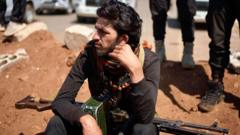As Syria rebuilds after a protracted civil war, foreign fighters who participated in the uprising against Assad are being absorbed into the new military structure, leading to complex views regarding their role and status among various stakeholders.
Foreign Fighters in Syria: Allies or Threats?

Foreign Fighters in Syria: Allies or Threats?
The integration of foreign fighters into Syria's new military raises questions about loyalty and international relations amid ongoing reconstruction.
Since the conclusion of the Syrian civil war, the role of foreign fighters who aided in the ousting of Bashar al-Assad has become increasingly significant as Syria's new leaders navigate the complexities of rebuilding their military and government. Many of these fighters have shown intent to stay in the country, galvanizing a sense of loyalty to the revolution in the eyes of the new regime.
In 2011, thousands flocked to Syria to support various rebel factions during the prolonged conflict that spanned nearly 14 years. While the foreign fighters are viewed as trusted allies of the revolution, their presence becomes a contentious point for the United States, which associates many with extremist groups like the Islamic State. This discrepancy highlights the challenges faced by the new leadership as they endeavor to establish diplomatic relations with global powers.
The Trump administration has recently indicated plans to potentially marginalize foreign fighters within Syria's governmental and military framework, suggesting that the U.S. may prefer to see these individuals either expelled or excluded from key positions. However, reports indicate that the Syrian government is concurrently incorporating these fighters into its military, reflecting a practical approach to bolstering its defense capabilities.
Ahmed al-Shara, the newly appointed president, was formerly the leader of a rebel group that embraced many foreign combatants. He must now delicately navigate between the fighters’ loyalties and the diplomatic imperative to align with nations opposed to their influence. As Syria’s government seeks to stabilize and rebuild, the ongoing integration of foreign fighters poses critical questions about the future of the nation’s governance and international relations.
















